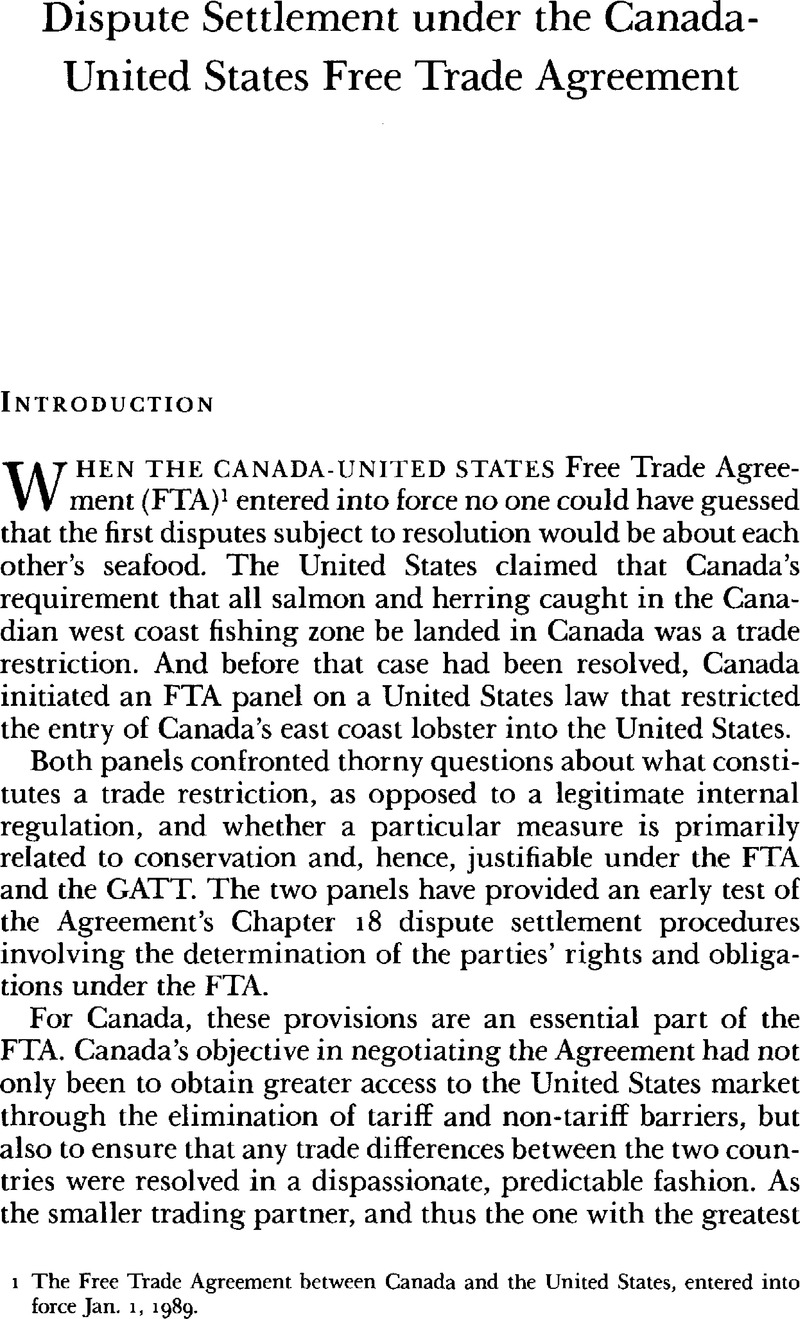No CrossRef data available.
Published online by Cambridge University Press: 09 March 2016

1 The Free Trade Agreement between Canada and the United States, entered into force Jan. 1, 1989.
2 An examination of the substance of FTA panel decisions is limited by the fact that Article 1807:4 states that the proceedings of the panel shall be confidential so that the parties’ written submissions to the panel are not public documents. However, the panel’s final report to the parties is made public.
3 Dispute settlement is also referred to in three other chapters: binding arbitration is made mandatory in the case of disputes of a party taking emergency action (Article 1103); certain conditions are placed on the use of Chapter 18 in so far as disputes on temporary entry of business persons is concerned (Article 1504), and under Article 1608 Investment Canada reviews are not subject to dispute settlement although other investment-related disputes are. It should also be noted that the Chapter 19 panel system is temporary, and is to be replaced by an agreed set of rules governing government subsidies and dumping.
4 The FTA states that the choice is made in the case of disputes under the Agreement when one party seizes the Commission with the dispute under Article 1805, but the question of when a party has chosen the GATT is less clear. To keep the regimes parallel, it would appear that a party has made an irrevocable choice for the GATT when panel proceedings are initiated by the GATT Council pursuant to Article 23(2) of the GATT.
5 FTA Article 1805:2
6 Canada Gazette, Part 1, Jan. 14, 1989. The rules may also be used for arbitration panels constituted under Article 1806.
7 Code of Conduct for Proceedings under Chapter 18 and 19 of the Canada-United States FTA, Canada Gazette, Part 1, Jan. 14, 1989.
8 Article 20 states: “Subject to the requirement that such measures are not applied in a manner which would constitute a means of arbitrary or unjustifiable discrimination between countries where the same conditions prevail, or a disguised restriction on international trade, nothing in this Agreement shall be construed to prevent the adoption or enforcement by any contracting party of measures … (g) relating to the conservation of exhaustible natural resources if such measures are made effective in conjunction with restrictions on domestic production or consumption.”
9 Final Report of the FTA Panel in the matter of Canada’s Landing Requirement for Pacific Coast Salmon and Herring, Oct. 16, 1989, para. 1.03
10 Artide 3(1) states: “The contracting parties recognize that internal taxes and other internal charges, and laws, regulations and requirements affecting the internal sale, offering for sale, purchase, transportation, distribution or use of products, and internal quantitative regulations requiring the mixture, processing or use of products in specified amounts or proportions, should not be applied to imported or domestic products so as to afford protection to domestic production.”
Article 3 (4) states: “The products of the territory of any contracting party imported into the territory of any other contracting party shall be accorded treat-ment no less favourable than that accorded to like products of national origin in respect of all laws, regulations and requirements affecting their internal sale, offering for sale, purchase, transportation, distribution or use. The provisions of this paragraph shall not prevent the application of differential internal transportation charges which are based exclusively on the economic operation of the means of transport and not on the nationality of the product.”
11 Understanding Regarding Notification, Consultation, Dispute Settlement and Surveillance, Nov. 28, 1979, BISD 26S/210. The standard terms of reference for GATT Panels are “to examine the matter and to make such findings as will assist the Contracting Parties in making the recommendations or rulings provided for it in paragraph 2 of Article XXIII.”
12 The first panel was chaired by a Canadian, Dean Donald McRae of the University of Ottawa, and the second by United States economist Bernard Norwood.
13 Since the adoption of the FTA, the GATT has made efforts to improve its dispute settlement procedures. The provisional procedures adopted at the Uruguay Round’s mid-term review meeting in Montreal in 1988 provide for the automatic right to a panel and, in general, panel procedures are to take six months from the time the panel is constituted (see Decision of the Contracting Parties of the GATT, L/648gof Apr. 13, 1989).
14 FTA Article 1807:6
15 FTA Article 1807:9
16 FTA Article 1807:8
17 Op. cit. supra note 9, at 7.11
18 Ibid., para. 7.16
19 Final Report of the FTA Panel on Lobsters from Canada, May 25, 1990, para. 7.22.1
20 Ibid., para. 8.1.4
21 The majority cited the Salmon and Herring report regarding the interpretation of Article 11 (para. 7.19.2) and on the relationship between it and Article 3 (para. 7.21) and the minority cited the report on the question of burden of proof (para. 9.3), and the interpretation of Article 20 (para. 9.4)
22 The “Decision of the Commission on Salmon and Herring” served as an international arrangement under the Export and Import Permits Act, R.S.C.E-19 permitting Canada to place unprocessed roe herring on the export control list. Pursuant to Article 407 of the FTA, exports of unprocessed roe herring are permitted to the United States as long as they are not simply transhipped to third parties. Japan is by far the greatest market for processed herring roe from Canada.
23 FTA Article 1807:7
24 Of the five Chapter 18 disputes listed in the Free Trade News issued by the Department of External Affairs and International Trade in December 1989, as being at the consultation stage, three (cable retransmissions, labelling of fruits and vegetables, and the tariff on wool) were no longer listed a year later. The decade-long dispute on plywood standards appears to be moving to resolution as a result of the FTA mechanism.